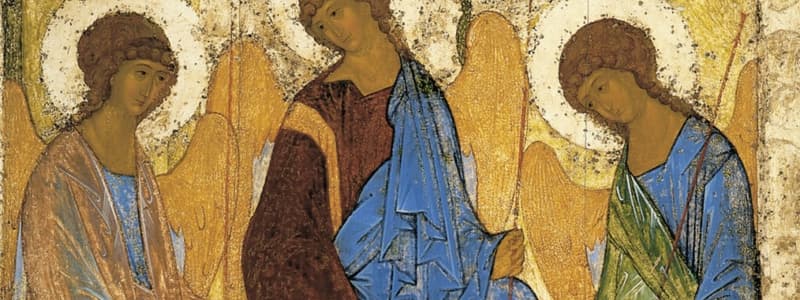Podcast
Questions and Answers
Questions are hidden until you start the quiz
Flashcards are hidden until you start studying
Study Notes
Introduction to the Trinity
- The doctrine of the Trinity is a solution to a problem faced by early Christians.
- The problem is a perceived contradiction between Judaism's strict monotheism and the worship of Jesus as God.
- Orthodox Jewish tradition emphasized monotheism, reciting prayers stating "Hear O Israel, the Lord is our God. The Lord alone" (Deuteronomy 6:4).
- This monotheism is reinforced in the Ten Commandments, "I am the Lord your God who brought you out of the land of Egypt" (Exodus 20:2-3).
- Christianity inherited this monotheistic tradition from Judaism.
Monotheism and the Worship of Jesus
- The apostle Paul, in condemning idolatry, affirmed the existence of only one God, the Father (1 Corinthians 8:4).
- Early Christians, while worshipping Jesus as God, remained committed to monotheism.
- Evidence includes prayers to Jesus and worship hymns.
- The religious environment of the Roman Empire included many deities. Early Christians' devotion to Jesus did not imply polytheism.
Sabellian Modalism
- This perspective suggests one God who takes on different roles through time (e.g., creator, redeemer).
- It's analogous to an actor who plays various parts in a drama.
- The biblical drama of creation, redemption, and new creation form the analogy.
- Paul's letter to the Colossians (1:15-20) speaks of Christ's role as creator and redeemer.
Logos Theology
- This approach focuses on the pre-existence of Jesus, with the Word (Logos) preceding earthly ministry.
- An important idea to consider from the Gospel of John's prologue (John 1:1-14).
- This pre-existing Word was with God and was God himself before becoming flesh in Jesus.
The Development of Trinitarian Theology
- Various historical figures have contributed to the development of perspectives on the Trinity over time.
The Apologists
- Individuals like Justin Martyr (100-165 CE) turned from Platonism to explore the connection between philosophy and Christianity.
- They used the concept of Logos to develop the theology of the Logos.
Subordinationism
- This approach highlights that the Father holds a superior position within the Trinity.
- Prominent figures like Justin Martyr and Origen of Alexandria addressed the supremacy of the Father, contrasting his relationship with other members of the Trinity.
- Some believe that Justin's approach to the Trinity suggests that the Son was a subordinate agent of God.
The Cappadocian Fathers
- Gregory of Nazianzus, Gregory of Nyssa, and Basil of Caesarea.
- They played key roles in refining and defending the Nicene doctrine of the Trinity.
Arianism and the Council of Nicaea
- Arius, a priest in Alexandria, argued that the Son was created, implying a hierarchical structure where the Father was more divine than the Son.
- The Council of Nicaea (325 CE) responded by defining the concept of "homoousios" (of the same substance) to clarify the equality of the Father, Son, and Holy Spirit within a unified God.
- Significant theological debates about whether there were three distinct gods or a single God in three modes of presentation (tritheism, modalism, or subordinationism) continued.
- These disputes were important for understanding the formulation of core Christian doctrine and contributed to the development of Trinitarian theology as the Council of Nicaea and later the council of Constantinople formally articulated the Trinity in the Christian faith.
The Holy Spirit
- Athanasius and other theologians stressed that the Spirit played a significant role in salvation, emphasizing the Spirit's divine nature and unity within the Trinity.
- They linked the works of the Father, Son, and Spirit to the unity of one God.
Studying That Suits You
Use AI to generate personalized quizzes and flashcards to suit your learning preferences.
Related Documents
Description
Test your understanding of the theological concepts surrounding the Trinity, including the roles of the Father, Son, and Spirit. Revise your learning on key figures like Tertullian and Origen, and their perspectives on God's nature and the doctrine of the Trinity. (Image: Andrei Rublev - Public Domain, accessed from https://commons.wikimedia.org/w/index.php?curid=54421)



